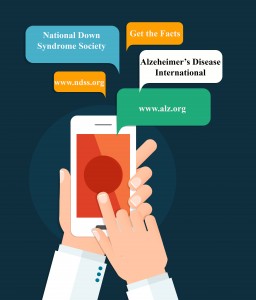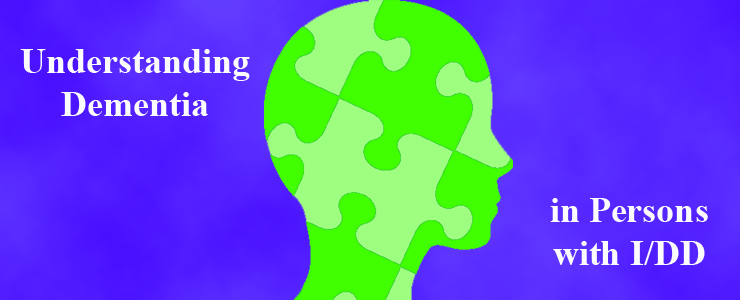People with Intellectual and Developmental Disabilities are living longer.
 Children and adults with I/DD are receiving better supports and living fuller lives than at any time in history. As a result, greater numbers of individuals with I/DD will develop dementia, a condition marked by a loss of intellectual skills and abilities.
Children and adults with I/DD are receiving better supports and living fuller lives than at any time in history. As a result, greater numbers of individuals with I/DD will develop dementia, a condition marked by a loss of intellectual skills and abilities.
While it is important not to assume that a person with I/DD has dementia simply because they are getting older; it is equally important that symptoms of dementia are not missed because they are mistakenly seen as part of a person’s disability.
An accurate diagnosis of dementia (which includes, but is not limited to Alzheimer’s disease) poses unique challenges for individuals with an intellectual disability because the characteristics of each may have some similarities (and, in the case of Alzheimer’s and Down syndrome, a possible genetic link).
The KEY DIFFERENCE between dementia and I/DD is the loss of a person’s typical level of functioning, or baseline.
While some characteristics of dementia and I/DD may look the same side by side, it’s the loss in an individual’s baseline abilities that can point to dementia.
The Importance of Defining a Baseline
A baseline provides the most reliable way to identify changes that may point to dementia. You can create a baseline informally by noting basic self-care skills, communication, talents, skills, daily activities and hobbies throughout adulthood.
A baseline can also be established formally with a memory specialist (such as a geriatrician, neurologist, psychiatrist or neuropsychologist), where abilities can be reviewed and memory abilities can be tested. These formal screenings are important to schedule throughout mid-to later-adulthood.
Common Signs of Dementia in a Person with an Intellectual Disability
 Confusion and problems with recent memory
Confusion and problems with recent memory- Wandering or getting lost in familiar places
- Moving with rapid, shuffling steps
- Loss of bladder or bowel control
- Laughing or crying inappropriately
- Difficulty following instructions
- Loss of speech
- Disorientation
- Loss of daily living skills
- Changes in personality
- Long periods of inactivity or apathy
- The development of seizures
These signs may also indicate a medical or mental health condition. Be sure to rule out physical illness or other cause (such as depression, stress, loss, change in environment). If you suspect the changes in a person’s baseline abilities are due to dementia and not other causes, consult a memory specialist for an evaluation.
Learn More
Alzheimer’s Association
Dementia and I/DD (pdf)
National Down Syndrome Society Aging and Down Syndrome Guidebook
Printable bulletin (pdf)





